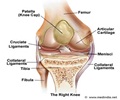
Not everyone can produce S-equol after soy consumption, as the production depends on the types of bacteria present in the large intestine and may be influenced by the amount of soy consumed.
In the study of 102 US postmenopausal women eight weeks of daily SE5-OH supplement doses containing 10, 20 or 40 milligrams (mg) of Natural S-equol reduced the frequency of moderate to severe hot flashes as did 50 mg doses of a soy isoflavone supplement.
Moreover, muscle and joint pain was reduced significantly in the 10 and 20 mg Natural S-equol groups compared to those in the isoflavone group.
"Together these data document that a minimum daily dose of 10 mg Natural S-equol would provide the benefit of both reducing the frequency of moderate to severe hot flashes as well as decreasing muscle and joint pain associated with menopause," said Belinda H. Jenks, director of Scientific Affairs and Nutrition Education at Pharmavite LLC.
Further research is needed to determine the effects of S-equol on bone metabolism and safety," explained Jenks.
Advertisement
Also, ultrasound measures of the thickness of the endometrial lining of the uterus and cellular studies of the tissue lining the vagina revealed no biological effect of the supplement on the women's reproductive organs. Furthermore, mammography examination results documented no differences among the women groups or between the study start and end.
Advertisement













